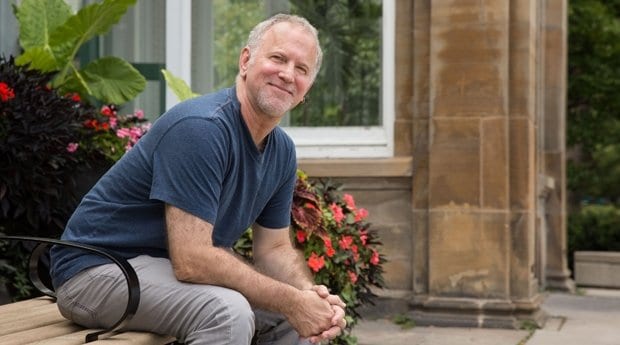David Arnold, 47, had been in excruciating pain and noticed blood in his stool. For months, doctors dismissed his complaints until he insisted on having a colonoscopy and biopsy taken. He was younger than most colon cancer patients when he was diagnosed — doctors recommend routine screenings beginning at age 50.
Arnold was lucky: the tumour was caught early. He received treatment and is now in remission. He credits the positive outcome with his own advocacy in pushing for treatment over the advice of his doctors.
The healthcare system can be difficult to navigate for anyone. The highly bureaucratic, rapidly evolving medical and technological landscape doesn’t abate the stress and fear related to a diagnosis of a potentially life-threatening disease. But LGBT people face additional hurdles when dealing with a system that doesn’t always consider their particular needs.
“I’ve been HIV-positive for 25 years . . . so I’ve been in the hospital a number of times,” Arnold says. “I knew that was going to be the best way to accelerate testing.”
Arnold says that he now has a good relationship with his doctors.
“About a year after my treatment . . . I went to see the oncologist and I asked him about having anal sex, and he was fantastic. He didn’t flinch or blink. He just dove into the answer like any other conversational issue,” he says. Unfortunately, he also discovered that receiving anal sex was no longer possible.
“My rectum hasn’t healed very well. Because it’s narrowed, sticking a dick up my bum isn’t going to be fun,” he says. “Part of me thinks, ‘I’m over 50 and maybe it’s just something that’s not going to be part of my sexuality going forward.’ That’s definitely a loss.”
That kind of openness and communication for LGBT people didn’t exist when Diane Charter lost her partner of 34 years, Arlene, to colon cancer. They’d been together at a time when it wasn’t safe to be out — particularly for Arlene, who worked in the police force and military.
“We lived in a smaller town where you don’t want other people to know your business, including the medical community. It was still local, so everybody talked,” Charter says. “If she did go in the hospital, I wouldn’t have access to her because I wasn’t family.
“When she finally went and had a colonoscopy, the tumour had compromised much of her system and was inoperable. The doctor said the tumour had been growing for 10 years. Had she gone earlier, she might still be here,” she says.
Charter sympathizes with people who are nervous or uncomfortable with getting screened for breast, colon or cervical cancers, but she says the peace of mind that comes with screening is worth it.
“There’s a natural reluctance about getting a colonoscopy. It’s not a pleasant thing to do,” she says. “When my doctor finally recommended that I have one, I was absolutely terrified because of the news my partner had. But I finally went and found it was not nearly as bad as I expected it to be.”
Charter volunteers with the Canadian Cancer Society’s Get Screened program as a health ambassador. She says the system is much more welcoming to LGBT people now.
“There’s a greater awareness, I think,” Charter says. “Healthcare professionals bring up the topic about your orientation, whereas they never used to.”
Brady Yu, a trans man and breast cancer survivor, argues that there still isn’t enough information about cancer treatment specifically for LGBT people.
“They don’t tell you what you have to worry about, when you go to fertility clinics. What kind of questions should you ask? What care are you entitled to that they may not know to offer you because they don’t know how to handle you?” he says.
Yu discovered a lump under a scar after having top surgery as part of his transition. He was 31. Because his doctor was proactive, he was treated quickly and has made a full recovery. But the journey through the system was fraught with surprising obstacles.
“We went to the breast clinic for my pre-surgery appointment, and they told me that because I was a man I had to wait outside in the hall,” he says. “That was obviously the volunteer being very well intentioned trying to protect the women’s space.
“Then you’re referred to a fertility clinic that only deals with women, and as a person who presents as male they’re very confused,” he says.
New messaging targeting the trans community through the Get Screened program may make it easier for trans people to navigate the system. Yu also hopes to become a peer counsellor for other trans people who are living with cancer, once he’s passed the first anniversary of the end of his treatment.
For Yu, the program is a good start. “The fact that they’re hearing it from trans people, that it’s okay to go and do these things . . . I think it sounds like a good campaign.”


 Why you can trust Xtra
Why you can trust Xtra


